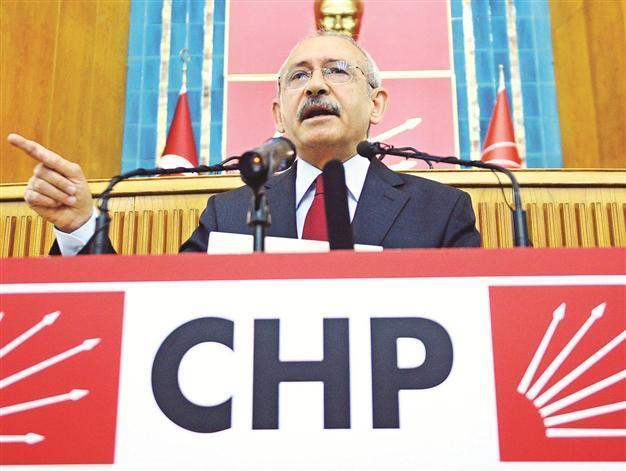Can peace process lead to amnesty?

Kılıçdaroğlu says an amnesty can be mulled if the PKK lays arms down. DAILY NEWS photo
The latest steps taken for a solution of the Kurdish issue may quickly transform into a process that requires sharp decisions. Since similar efforts on the matter were interrupted in the past, all sides feel it necessary to move very cautiously and not to allow any provocation. In fact, the previous demands of Abdullah Öcalan, the imprisoned leader of the Kurdish movement, the Peace and Democracy Party (BDP), and the outlawed Kurdistan Workers’ Party (PKK), are well-known. Let’s remember the main titles in the previous “Oslo process”:- The necessity to complete all works on the constitutional and legal basis for a permanent solution.
- Negotiating the draft documents, including the “Draft of Principles of Democratic Solutions to the Main Social Problems in Turkey,” the “Draft of Principles of Fair Peace in Relations between the State and Society in Turkey” and the “Draft for a Democratic Solution of the Kurdish Question and Action Plan for Fair Peace,” all of which were submitted by Öcalan.
- Negotiating the names for the Constitutional Council, the Peace Council and the Truth and Justice Commission.
- Two individuals representing the PKK allowed to visit Öcalan.
- An end to pressure on members of the press, and an end to detention of the political and legal representatives of the Kurdish people.
- Release of those arrested as part of the Kurdistan Communities Union (KCK) operations.
- An end to conflict for a permanent solution of the Kurdish issue.
- It is a necessity that all the military, political and diplomatic operations must end and both parties should end all the operations and military movements.
Within this framework, a democratic Constitution that recognizes Kurds, education in mother tongue, an end to the isolation of Öcalan, house arrest, lowering the election threshold, democratic and autonomous local administrations, the right to defense in mother tongue, release of the KCK defendants, and - though not explicitly stated - a “general amnesty,” are among topics for negotiation.
So, in what ways have these demands been met so far? What will persuade Öcalan and make the PKK lay down its arms? In the corridors of the BDP, it is clearly expressed that defense in mother tongue, release of the KCK defendants, and such regulations will not be enough to persuade Öcalan. They say Öcalan will demand rather more. If the PKK is to permanently lay down its arms, they have no doubt that Öcalan, as well as high ranking authorities in the PKK and the BDP, will put forward a “general amnesty” as a sine qua non. In addition, the wider BDP and the Democratic Society Congress (DTK) are also in favor of this. What’s more, it is underlined that they will insist that Öcalan and other authorities benefit from the amnesty too.
The opposition also has the same foresight. A meeting held under the chairmanship of main opposition Republican Peoples’ Party (CHP) leader Kemal Kılıçdaroğlu last week stated: “If the PKK lay down arms, a general amnesty would be brought onto the agenda. In order to prevent public pressure, possible public reactions could be balanced by including convicts in the Ergenekon and Balyoz coup plot cases in this amnesty.” In such an event, the CHP would not reject a general amnesty that covers Ergenekon and Balyoz convicts.
The ruling Justice and Development Party (AKP) is aware of this possibility. An amnesty law, which is supported by the AKP, the CHP and the BDP, may also be adopted by the public. “Although the Nationalist Movement Party (MHP) may attempt to manipulate it, it would not be able to raise its voice too much in an atmosphere where terrorism had come to an end, arms were silenced, and peace was declared. In such a situation, a general amnesty becomes inevitable,” an experienced political figure said.
Even though there is still a very long way to go, movements in the corridors show that most of Parliament would favor a general amnesty when the time comes. It is also being whispered in the corridors that such a peace process would greatly contribute to Erdoğan’s much-expected upcoming presidential campaign.
BDP immunity is in abeyance
Files on the political immunity of seven BDP deputies and one independent deputy were formerly sent to Parliament’s Constitutional Justice Joint Commission on the grounds that they had been photographed hugging members of the PKK. After Erdoğan saying, “We will do what is necessary in Parliament,” speakers of the ruling party said the files might be dealt with during the first weeks of the New Year. According to speculations, however, following the restart of negotiations with Öcalan, the files went into abeyance.
Independence courts a target?
Burhan Apaydın, the lawyer of former Prime Minister Adnan Menderes who was executed by a military junta in 1961, has appealed to Parliament’s Petition Commission for a retrial.
Turkish Parliament’s Legal Services Department has indicated that this would be possible through the enacting of a new law.
However, some in the opposition are interpreting this initiative as being aimed at retrying cases heard in the “Independence Courts,” which were established at the beginning of the Republican period and issued many death penalties.











